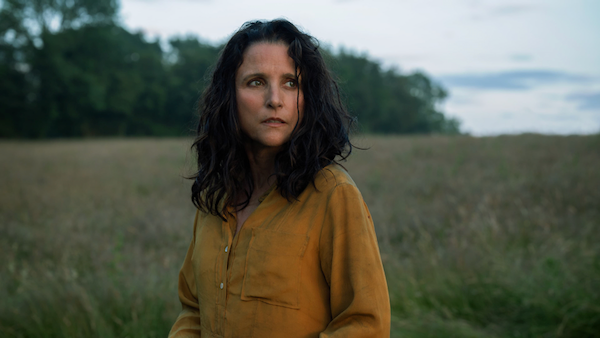Movie review by Greg Carlson
Daina Pusić’s feature narrative debut “Tuesday” premiered at the 2023 Telluride Film Festival last September. A joint production of A24, BBC Film and the British Film Institute, the movie stars Julia Louis-Dreyfus and Lola Petticrew as mother and child on a journey toward the death of the latter from a terminal illness. In an unorthodox bit of character design, the principal performers are joined by the manifestation of Death as a CGI-enhanced macaw voiced with a gravelly rasp by the Nigerian-born, London-based actor and playwright Arinzé Kene. This curious story element should draw at least a few adventuresome viewers looking for an offbeat alternative to big budget summer fare.
Pusić, working from her own original script, makes several imaginative and exciting narrative choices to work terrain that dates to the earliest theatrical drama performed on the stages of ancient Greece. Grappling with some of the most basic philosophical questions, from the meaning and/or meaninglessness of life to the existence and/or non-existence of an all-powerful creator, the filmmaker ambitiously reckons with several of the toughest dimensions accompanying grief and the process of letting go. Common wisdom says that children should bury their parents and not the other way around; Pusić leans heavily on Louis-Dreyfus to convey the emotional chaos that accompanies the guilt and despair of such an awful situation.
At 111 minutes, “Tuesday” labors to successfully sustain its length. Despite the fleeting presence of a few folks briefly on hand to illustrate the overwhelming and exhausting job requirements of Death (who at one point unburdens himself regarding the taxing workload and the cacophony of voices that fill his head), the only really significant person outside the primary trio is the home health/hospice nurse played by Leah Harvey. A source of potential viewer frustration, Pusić deliberately withholds any back stories, side stories, or, for that matter, any sort of material that would expand and deepen the characters.
The filmmaker’s choices aren’t entirely devoid of charm, however. After bargaining with Death for a little more time, the title fifteen-year-old deconstructs the bittersweet message in Ice Cube’s melancholic masterpiece “It Was a Good Day,” discovering that the Grim Reaper is a fellow hip-hop fan. The bird, who can grow to enormous size or shrink small enough to perch inside Tuesday’s ear, inspires many questions ultimately left unanswered. In one extended sequence that echoes the premise of Piers Anthony’s 1983 novel “On a Pale Horse,” mother Zora, with Tuesday strapped to her back, temporarily takes on Death’s occupational responsibilities.
Pusić never quite brings all of the disparate components together in a satisfying manner; we are bounced between the reconciliation of the more concrete parent/child relationship and the fantasy abstractions represented by the supernatural parrot. Petticrew’s Tuesday – beautiful, calm, and dignified even as Zora fights to keep herself together – belongs to the cinematic tradition coined by Roger Ebert as Ali MacGraw’s Syndrome/Disease: “the medical condition in which you grow more and more beautiful until you die.” Add “Tuesday” to the group containing “Love Story,” “Restless,” “The Fault in Our Stars,” “Me and Earl and the Dying Girl,” and countless others.
